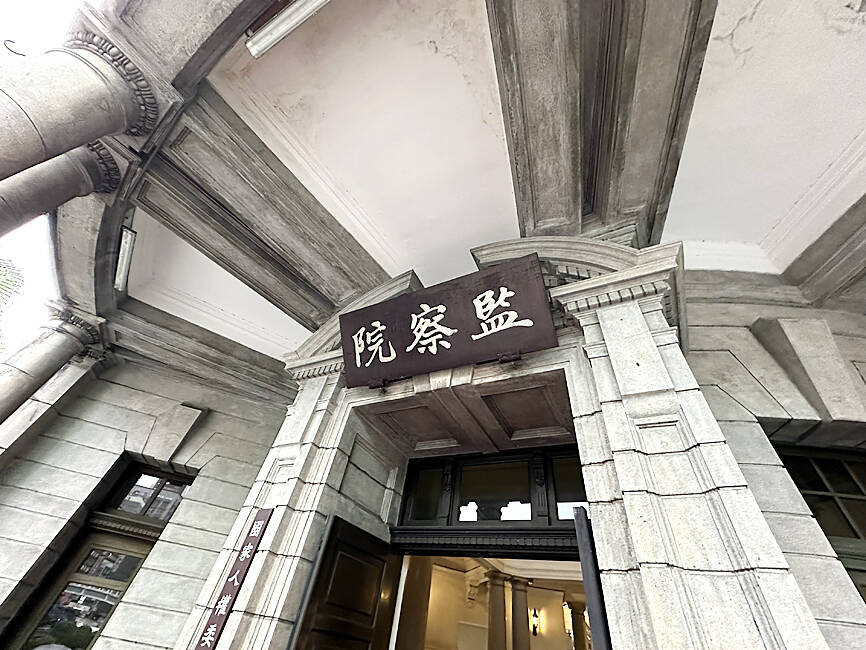The Control Yuan yesterday approved its probe report on a near-shore solar power project in Changhua County, with a decision to censure the Ministry of Economic Affairs for negligence and misconduct leading to an estimated NT$7 billion (US$213.10 million) loss to the government’s renewable energy incentive program.
Complaints by politicians about ministry officials favoring certain contractors and accusations of undue profiteering had led to the Control Yuan conducting a probe, relating to the ministry’s handling of a public tender for solar power generation at the Changhua Coastal Industrial Park (彰化濱海工業區).
The report said the ministry began the public tender process in 2016, under the national plan to boost renewable energy capacity, aiming to establish solar power farms to generate electricity, providing financial incentives and sites for firms to set up at the Changhua Coastal Industrial Park, which covers areas of the county’s three townships.

Photo: Lin Yuan-che, Taipei Times
The probe by Control Yuan members showed flaws in the ministry’s incentive schemes, specifically regarding how it calculated the feed-in tariff rate and the credit for excess electricity that solar panels or related power generators feed back into the grid, which was allegedly designed to favor Hsinchu City-based United Renewable Energy Co (URE, 聯合再生).
The ministry had neglected to set a lower limit for the feed-in tariff rate, and then adjusted the criteria during the public tender review and evaluation process, resulting in URE winning the tender for Site No. 4, despite the firm stipulating that it would only return to the government the low tariff rate of up to 3 percent, the probe found.
Local politicians and lawmakers raised questions on why URE won the tender, despite reports of another energy firm having offered much higher returns back to the government, at 20 percent for the first 10 years and 30 percent for the next 10 years.
Control Yuan members estimated the overall loss to be NT$7 billion for the duration of two decades when comparing the promised rates of the two companies.
In addition, the report said the ministry failed to act to terminate the agreement when less than one year after winning the tender bid, URE executives sold the ownership to another firm, while the ministry only demanded that URE buy back the ownership rights.
Company executives used a complicated business scheme to sell company stocks while showing on paper that the company still owned shares so they could partake in board meetings and make decisions, the probe said, adding that the company had contravened the requirements of the public tender.
In a separate probe on the Taipei Dome project, the Control Yuan censured the Taipei City Government and the Ministry of the Interior (MOI), in a report released earlier this month.
The report said that in the Taipei Dome build-operate-transfer (BOT) project agreement signed in 2006 with Farglory Group (遠雄集團), the Taipei City Government and the MOI had supervisory and oversight responsibilities, but government officials failed in their duties to ensure that in addition to sporting events, the Dome would be able to hold entertainment events.
When signing the BOT agreement, the city government awarded the operating rights to Farglory Group up until 2062, but during construction, the project met with numerous disputes and legal problems.
The project was completed last year.

Taiwanese can file complaints with the Tourism Administration to report travel agencies if their activities caused termination of a person’s citizenship, Mainland Affairs Council Minister Chiu Chui-cheng (邱垂正) said yesterday, after a podcaster highlighted a case in which a person’s citizenship was canceled for receiving a single-use Chinese passport to enter Russia. The council is aware of incidents in which people who signed up through Chinese travel agencies for tours of Russia were told they could obtain Russian visas and fast-track border clearance, Chiu told reporters on the sidelines of an event in Taipei. However, the travel agencies actually applied

Japanese footwear brand Onitsuka Tiger today issued a public apology and said it has suspended an employee amid allegations that the staff member discriminated against a Vietnamese customer at its Taipei 101 store. Posting on the social media platform Threads yesterday, a user said that an employee at the store said that “those shoes are very expensive” when her friend, who is a migrant worker from Vietnam, asked for assistance. The employee then ignored her until she asked again, to which she replied: "We don't have a size 37." The post had amassed nearly 26,000 likes and 916 comments as of this

New measures aimed at making Taiwan more attractive to foreign professionals came into effect this month, the National Development Council said yesterday. Among the changes, international students at Taiwanese universities would be able to work in Taiwan without a work permit in the two years after they graduate, explainer materials provided by the council said. In addition, foreign nationals who graduated from one of the world’s top 200 universities within the past five years can also apply for a two-year open work permit. Previously, those graduates would have needed to apply for a work permit using point-based criteria or have a Taiwanese company

The Shilin District Prosecutors’ Office yesterday indicted two Taiwanese and issued a wanted notice for Pete Liu (劉作虎), founder of Shenzhen-based smartphone manufacturer OnePlus Technology Co (萬普拉斯科技), for allegedly contravening the Act Governing Relations Between the People of the Taiwan Area and the Mainland Area (臺灣地區與大陸地區人民關係條例) by poaching 70 engineers in Taiwan. Liu allegedly traveled to Taiwan at the end of 2014 and met with a Taiwanese man surnamed Lin (林) to discuss establishing a mobile software research and development (R&D) team in Taiwan, prosecutors said. Without approval from the government, Lin, following Liu’s instructions, recruited more than 70 software